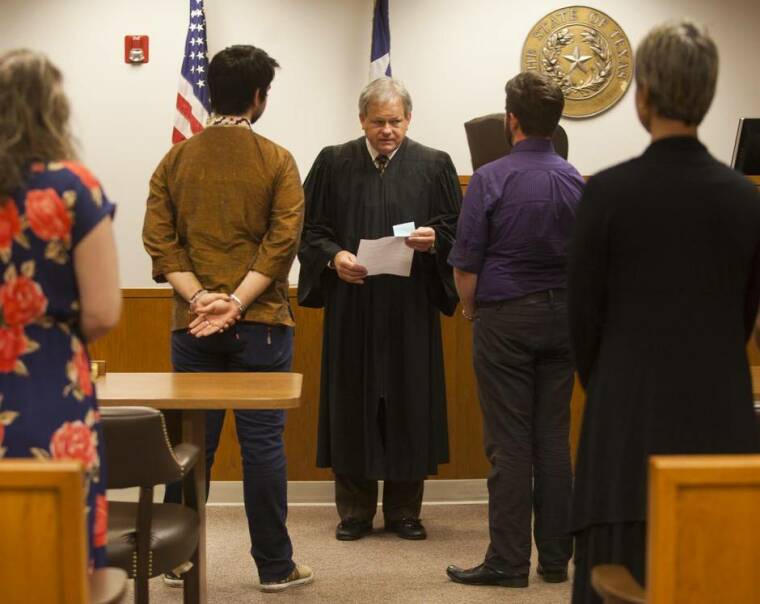Texas judge changes wedding ceremony after Supreme Court ruling on gay marriage

THE COLONY, Texas (Christian Examiner) – A Texas justice of the peace announced July 9 he will perform same-sex marriages if and only if gay couples acknowledge his personal disagreement with the practice and follow strict guidelines during the wedding ceremony.
Judge James DePiazza, justice of the peace for Precinct 2 in North Texas, issued a new form last week citing the Supreme Court's ruling in Obergefell v. Hodges. On that form, Justice DePiazza acknowledged that marriage is now, as a matter of law, open to all citizens regardless of gender.
The document also claimed:
"The result of this ruling has not changed Judge DePiazza's personal convictions on marriage, but has changed the way he is now conducting ceremonies."
"Judge DePiazza will no longer be providing marriage ceremonies in the traditional manner. The ceremony will strictly be a witnessing to the declaration of marriage, presented by Judge DePiazza, by both parties under the laws of the State of Texas. Judge DePiazza prefers to NOT conduct same-sex ceremonies, but will not decline anyone who chooses to schedule with him," the document also said.
In addition to the statement on the judge's personal beliefs, the document included new rules for the wedding ceremony, including a ban on photography until after the judge had left the courtroom. At the foot of the form, applicants for a marriage ceremony were expected to sign an acknowledgment of the judge's opinion.
Under the Religious Freedom Restoration Acts, justices of the peace and judges may claim that the government forcing them to conduct a same-sex wedding ceremony over their religious objection, when other authorized individuals have no objection, is not the least restrictive means of the government ensuring that the ceremonies occur, assuming that is compelling governmental interest.
"While we may not necessarily agree with, we accept Judge DePiazza's position on same-sex marriages, accept the conditions expressed above and understand that there will be no discussion regarding his position before, during or after the ceremony," the form read.
Critics of the judge's position have lodged the predictable charges that the judge cannot voice his personal views on same-sex marriage, but must only fulfill his duty to marry a gay couple if asked. But the law is not on their side.
Under Texas law, judges are authorized to perform weddings but not required to perform them. They may refuse any request and seek another judge to perform the ceremony, Texas Attorney General Ken Paxton recently noted in a ruling from his office.
"So long as other authorized individuals are willing to conduct same-sex wedding ceremonies, these statutory provisions demonstrate the practical reality that a refusal by a religiously objecting justice of the peace or judge cannot prevent a same-sex couple from participating in a wedding ceremony contemplated by state law," Paxton wrote in the ruling.
"Under the Religious Freedom Restoration Acts, justices of the peace and judges may claim that the government forcing them to conduct a same-sex wedding ceremony over their religious objection, when other authorized individuals have no objection, is not the least restrictive means of the government ensuring that the ceremonies occur, assuming that is compelling governmental interest."
After news of DePiazza's decision to notify same-sex couples of his personal objection to the practice of same-sex marriage went public, the form on the precinct' s website was modified to soften the language originally used by the judge.
The new form, though it still references the Supreme Court decision in Obergefell v. Hodges, no longer speaks to the judge's personal beliefs and does not contain the statement that he prefers not to marry same-sex couples. It now reads:
"The result of this ruling changed the way Judge DePiazza is now conducting ceremonies. Judge DePiazza will conduct a brief formal declaration of civil marriage ceremony that will strictly be a witnessing to the individuals acknowledgement that they want to be married under the laws of this State and be bound to the marriage laws in the State of Texas. A civil declaration will be read by Judge DePiazza that both parties respond with affirmation. Judge DePiazza requires the same paperwork and conducts the same ceremony for all couples."